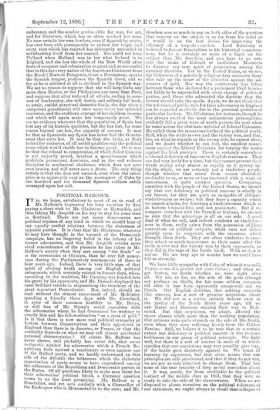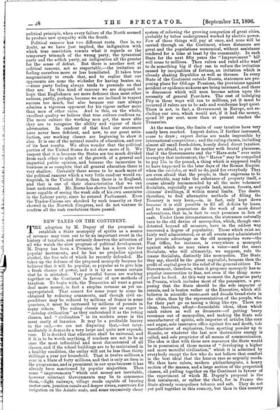POLITICAL RANCOUR.
IT is,we hope, satisfactory to most of us to read of Mr. Balfour's beginning his long vacation by first paying a short visit to Mr. Gladstcne at Hawarden, and then taking Mr. Asquith on his way to stay for some time in Scotland. There are not many democracies nor political regimes of any kind in which we should hear of any equally cordial relations between the statesmen of opposite parties. It is clear that Mr. Gladstone. whatever he may have thought in the warmth of the Home-rule campaign, has no lingering belief in the infamy of his former adversaries, and that Mr. Asquith retains more vivid remembrance of the pleasure he has taken in Mr. Balfour's society when they met among " the Souls " or in the recreations at Olympia, than he ever felt annoy- ance during the Parliamentary tournaments of three or four years ago. Indeed, there is very little sign of that spirit of abiding wrath among our English political antagonists, which certainly existed in former days, when, according to the tradition, Mr. Canning was hunted into his grave by his opponents, and Mr. Disraeli displayed his most brilliant talents in stigmatising the treachery of the great repentant Protectionist. Nor, indeed, should we read without the utmost amazement of Mr. McKinley spending a friendly three days with Mr. Cleveland, in spite of their common hostility to Mr. Bryan, or still less of Mr. Bryan's social amenities with the adversaries whom he had denounced for wishing to crucify him and his fellow-silverites " on a cross of gold." Is it that there is now more real political sympathy at bottom between Conservatives and their opponents in England. than there is in America, or France, or that the cordiality depends on what we may call almost accidental personal characteristics ? Of course Mr. Balfour has never shown, and probably has never felt, that saeva trulignatio against his adversaries which a French Re- publican feels against a reactionary or even against one of the Rallied party, and we hardly understand on this side of the Atlantic the bitterness which the elaborate organisation of party seems to have engendered among the adherents of the Republican and Democratic parties in the States. Of all questions likely to make men thirst for their adversaries' political blood, a Currency question seems to us the least promising. Mr. Balfour is a Bimetallist, and yet acts cordially with a Chancellor of the Exchequer who is Monometallist to the core; and Mr. Goschen sees so much to say on both sides of the question that rancour on the subject is as far from his mind as it would be on the best device for improving the efficiency of a torpedo - catcher. Lord Salisbury is believed to favour Bimetallism in his historical conscious- ness, but he is certainly no more of a bigot on the subject than Mr. Gosehen, and you have to go out- side the ranks of Cabinet or ex-Cabinet Ministers to discover any true spirit of persecution among the currency theorists. Yet in the United States, as we see, the bitterness of a genuinely religious fury animates those who take up the cause of the silverites against the ad- vocates of gold. Nor was the controversy less bitter between those who declared for a permanent Civil Service not liable to be superseded with every change of political parties, and those who advocated the doctrine that the victors should take the spoils. Again, we do not think that the tolerance of public men for their adversaries in England can be regarded as chiefly due to the personal qualities of particular leaders. Mr. Gladstone, for instance, though he has always avoided the more acrimonious personalities, evidently felt a great wave of wrath possess his soul when he came across the obstinate unbelief of Liberal Unionists. He called them the monstrous births of the political world. Still, when the strife is over and the victory won, and that, too, on what he regards as the wrong side, he cannot show, and we doubt whether he can feel, the smallest resent- ment against the Liberal Unionists for turning the scales against his Irish proteges. There is certainly somewhere a blessed deficiency of rancour in English statesmen. They can feel very hotly for a time, but they cannot prevent their wrath oozing away almost as rapidly as it sprang up. On the whole, we are certainly not a vindictive people, though whether that arises from causes absolutely creditable to us, or more or less tinctured with a want of earnestness, is quite another question. Comparing ourselves with the people of the United States, we should say that our deficiency in political rancour is wholly in our favour, for they are quite as incapable of ultimate vindictiveness as we are; but they have a capacity which we cannot admire, for fostering a vindictiveness which is at bottom business-like, and not passionate. But if we compare ourselves with the French or Italians, we are not so sure that the advantage is all on our side. A good deal of what we call, and indeed. condemn as vindictive- ness in them, really arises from the possession of [deep convictions on political subjects, while ours not unfre- quently seem to evaporate with the occasions which brought them forth. They are often vindictive because they attach as much importance to their cause after the strife is over and the victory won by their opponents, as they did in the rage of the battle itself. With us that is not so. We are very apt to wonder how we could have felt so strongly.
We have little sympathy with Cato, of whom it was said, Victrix causa diis placuit sed vicla Catoni ; and when we get beaten, we doubt whether we were right after all. We are, so far, on the side of the gods (though not perhaps on God's, for his cause seldom conquers till after it has been apparently conquered) not on Cato's. Our English doctrine, that nothing succeeds like success, has a sort of genuine scepticism about it. We did not as a nation entirely believe even in the justice of the North thirty years ago, till we saw Grant and Sherman winning their way to Rich- mond. But this scepticism, we admit, affected the upper classes much more than the working population. Our artisans were quite staunch on the side of the North, even when they were suffering keenly from the Cotton Famine. Still, we believe it to be true that to a certain extent our deficiency in political rancour is due to some feebleness in our grasp of political principle. We fight well, but there is a sort of reserve in most of us which signifies that our convictions may very possibly give way, if the battle goes decisively against us. We boast of learning by experience, but that often means that our principles are only provisional, and that if they do not win, we are not so very reluctant to change them. That has none of the true tenacity of deep moral conviction about it. It was, surely, far from •creditable to the political instinct of the middle class in 1861, that they were so ready to take the side of the slave-owners. When we are disposed to plume ourselves on the political tolerance of our statesmen, we ought always to recall that,collapse of political principle, when every failure of the North seemed to produce new sympathy with the South.
Political rancour has two different roots. One is, no doubt, as we have just implied, the indignation with which true conviction resents what it regards as the temporary triumph of the wrong party, the tyrannical party and the selfish party, an indignation all the greater for the sense of defeat. But there is another sort of political rancour, not so respectable,—the irritation at feeling ourselves more or less humiliated. It takes true magnanimity to crush that, and to realise that our opponents are none the wickeder for having beaten us, .—since party feeling always tends to persuade us that they are. In this kind of rancour we are disposed to hope that Englishmen are more deficient than most other nations, partly, perhaps, because we are inclined to respect success too much, but also because our race always admires a vigorous opponent for his vigour rather more than men of other races. And in this, on the whole, excellent quality we believe that true culture confirms us. The more culture the working men get, the more able they are to recognise the ability and vigour of their adversaries. In candour of that kind our statesmen have never been deficient, and now, to our great satis- faction, our working classes are beginning to show it also. It is one of the natural results of education, and one of its best results. We often wonder that the political parties of the United States do not show more of it. We suspect that it is because the States are too much divided from each other to admit of the growth of a general and impartial public opinion, and because the immersion in business is so complete that all general education there is very shallow. Certainly there seems to be much more of the political rancour which a very little candour would ex- tinguish, in the United States, than there is in England, and that is one of their characteristics that we can least understand. Mr. Burns has shown himself more and more capable of seeing the weak side of his own associates in the Labour party, since he entered Parliament. Even the Trades-Unions are shocked by such temerity as they showed in the Norwich Congress, and do not venture to confirm all the rash resolutions there passed.



































 Previous page
Previous page